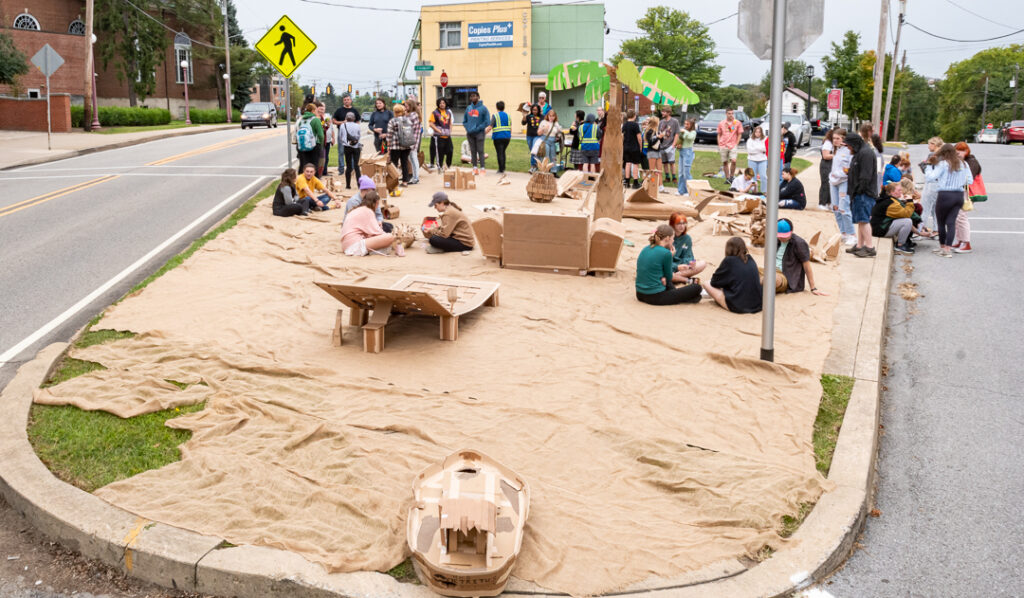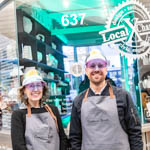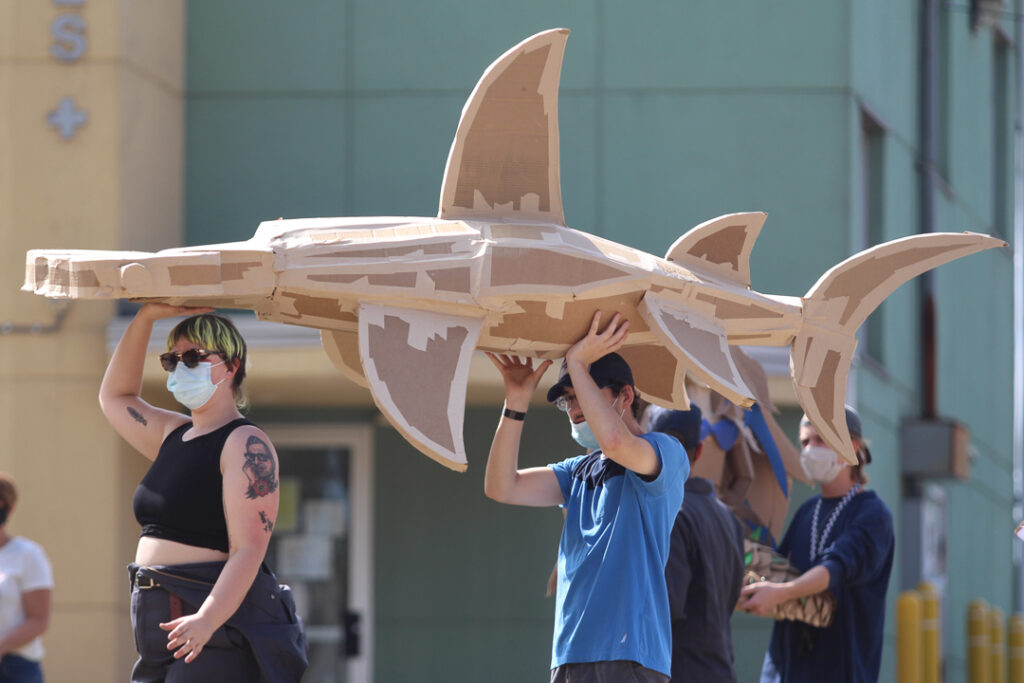
Sharon Massey and Sean Derry find a rare piece of public land on which to stage fanciful worlds in cardboard.
This project was directly inspired by the COVID pandemic shutdown in the summer of 2020. As we talked over Zoom about how to continue working on participatory public art projects despite travel restrictions and the need for social distancing, we came up with the idea for Traffic Island Oasis, a temporary tropical getaway located on a traffic island. This location would allow us to make use of an underutilized public space while adhering to pandemic safety guidelines that called for outdoor gatherings, and most importantly, it provided a way for participants to “travel” and have a new experience during a time of isolation and uncertainty.
We located a suitable traffic island and made a nine-foot-tall palm tree from cardboard and a fake sandy beach using burlap fabric. As educators, we wanted to collaborate with our students on the project, and so they were each tasked with making an item for the island using post-consumer cardboard. They came up with a wide range of ideas for objects for the island, including chairs, sharks, boats, lighthouses, chickens, treasure chests and more. We placed everything on the island and invited masked friends and family to tour Traffic Island Oasis on a sunny Sunday afternoon in 2020.
We’ve repeated the event five times so far, adding to it each time. Now we have tropical drinks, island-themed music, and a vote for the People’s Choice Award (the trophy is a pineapple). We typically have approximately 100 visitors to the island during the one-hour duration of the installation. This doesn’t include the many motorists who drive by and wave or honk at the island’s inhabitants. As a side note, we’ve never asked for permission to host an event on the traffic island, and so far we haven’t had any problems.
We acknowledge and embrace the absurdity of Traffic Island Oasis, and feel that the unusual public location helps to disarm the viewing of art for people who might not otherwise engage in such an activity. We are also motivated by providing our students with a public venue for exhibiting their artwork, which appears to improve their investment in the project and introduces ideas about site-specificity and social engagement.
Traffic Island Oasis credits PARK(ing) Day by the collective Rebar as an inspiration. Starting in San Francisco, California in 2005, Rebar created mini-parklets in metered parking spaces, taking advantage of extremely affordable real estate in an otherwise expensive urban landscape. In the 2009 PARK(ing) Day Manifesto, Rebar defines such terms as Tactical Urbanism, “the use of modest or temporary revisions to urban space to seed structural environmental change,” and Generous Urbanism, “the creation of public situations between strangers that produce new cultural value, without commercial transaction.” More information about PARK(ing) Day can be found at myparkingday.org
These ideas of Tactical Urbanism and Generous Urbanism are central to the premise behind Traffic Island Oasis even though our projects are located in a more rural setting in Western Pennsylvania. By installing a tropical island on an otherwise unused grassy space, we hope to raise questions about the ownership of public spaces and increase a sense of belonging for local residents. We also aim to instil a sense of curiosity and creativity by providing an unexpected cultural experience for participants and observers. Traffic Island Oasis is a completely free event—even the material used in the project is free post-consumer cardboard which is recycled at the conclusion of the installation.
We plan to continue to install and iterate on Traffic Island Oasis each Fall with our students and would consider taking the project to other interested venues. As with any outdoor project, wind and rain are sometimes challenging factors, but we’ve tried to embrace bad weather as a “tropical storm.” We love to see what unusual items our students decide to create for each new version of the project, as do return visitors to the island. The winners of the People’s Choice Awards are frequently the most creative and well-executed objects on the island, reinforcing some of the values we try to instil as arts educators. Even more important is the sense that the project requires collaboration and authentic input from every participant. Traffic Island Oasis celebrates the creativity of each contributing artist, and the coordinated display of their work produces a project with broader perspectives than would be possible by a single artist.
About Sharon Massey and Sean Derry
 Since 2017, artists and educators Sharon Massey and Sean Derry have collaborated as Local X Change. Located in Western Pennsylvania in the United States, Sharon and Sean seek to democratize art and technology through civically engaged projects, such as their forthcoming Studio Stream project featuring a mini-truck transformed into an earthbound communication satellite that will broadcast a teen-led radio station.
Since 2017, artists and educators Sharon Massey and Sean Derry have collaborated as Local X Change. Located in Western Pennsylvania in the United States, Sharon and Sean seek to democratize art and technology through civically engaged projects, such as their forthcoming Studio Stream project featuring a mini-truck transformed into an earthbound communication satellite that will broadcast a teen-led radio station.





Comments
Creo que estas experiencias efímeras en espacios públicos se pueden convertir en experiencias duraderas dentro de unos cuantos hogares. No deja de ser interesante la creatividad sin ánimos de lucro, en poblaciones donde la gente no tiene que hacer cosas para obtener el sustento.
Me encanto conocer estos proyectos simpaticos en paises desarrollados.